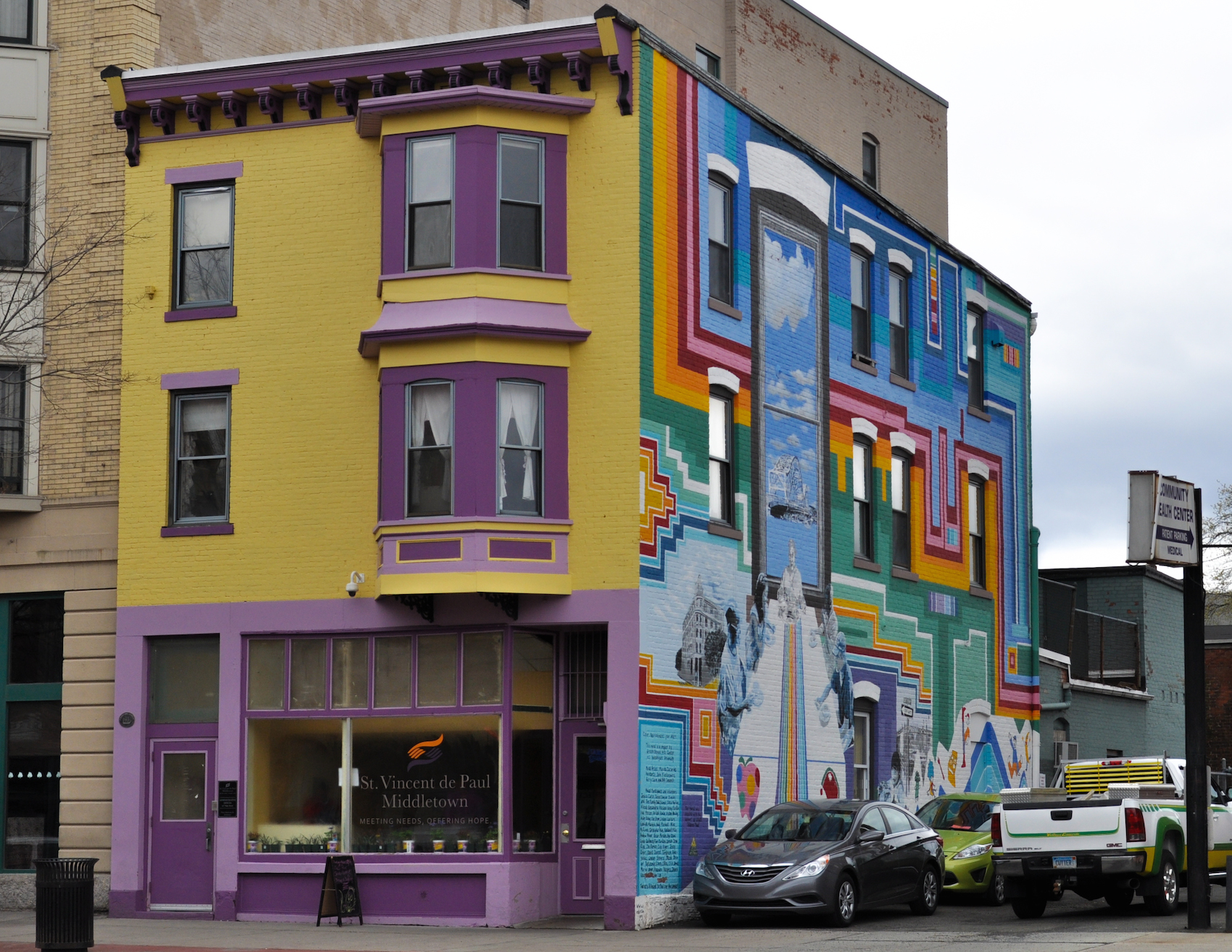
In Middletown, homelessness and hunger remain pressing issues. In Middlesex County, of which Middletown is the county seat, 470 individuals—including members of 39 families—lived in emergency or transitional housing in 2011, according to the most recent data available from the Connecticut Coalition to End Homelessness. The county is home to the same percentage of homeless individuals as that of the entire state of Connecticut. In both cases, shelters and transitional housing programs are often filled to capacity. A great number of programs exist to provide vital services to those struggling around us, and more help is always welcomed.
Members of the University community often note that there exists a barrier between the campus and the greater Middletown area. Through the Center for Community Partnerships in the Office of Community Service, many programs work to bridge the gap between the adjacent communities including the Green Street Teaching and Learning Center, the Center for Prison Education, and the WESU 88.1 FM radio station. Devonaire Ortiz ’18, however, noticed another area that could see greater involvement from University students: St. Vincent de Paul.
A local organization affiliated with the Catholic Church, St. Vincent de Paul operates a food pantry, a soup kitchen, and various community outreach programs to combat hunger and homelessness in Middletown and the surrounding area. Ortiz is in the process of organizing students to participate in activities not already covered by other University groups also working on alleviating these issues. In particular, Ortiz is enthusiastic about aiding St. Vincent de Paul and Middletown on reaching their goal of eliminating hunger and homelessness rather soon.
“We’re still working on a name for it, but basically it’s a sort of partnership that’s come out of the Community-Based Partnerships arm of the Office of Community Service,” Ortiz said. “What St. Vincent de Paul does is work on combatting homelessness and hunger in Middletown, and I think there’s an initiative of some sort to completely eliminate chronic homelessness by 2018 in Middletown, and we’re supposed to be well on our way there. So that’s sort of how I first got excited about it.”
Ortiz aims for groups of students to engage with the visitors of St. Vincent’s, sharing meals and achieving a greater understanding of aspects of Middletown life outside the University. His vision is derived from a project undertaken by students and a professor at Middlesex Community College, who have previously published the stories of the county’s homeless population.
Student participation is encouraged for a variety of activities, from simply sharing meals to providing manual labor unable to be done by St. Vincent’s regular volunteers, many of whom are rather advanced in age. Additional volunteers are also needed for special events organized by St. Vincent’s directors.
At a general interest meeting held on Wednesday, March 23, an agenda was set forth with activities to begin in the coming weeks. Beginning this week, students are welcome to sign up to take a ride down to St. Vincent’s and volunteer in the Amazing Grace Food Pantry or share a meal at the soup kitchen with visitors, assuming there are enough resources and extra volunteers are not needed.
“Ideally, as we move into working with St. Vincent, it is important to keep in mind that this project’s foremost aim is to increase engagement between Wesleyan students, the Middletown community, and those facing challenges of homelessness, hunger, and need of all kinds,” Ortiz wrote in an email to interested students. “This comes from a belief that engagement nurtures understanding, respect, and ideally, joy for everyone involved.”
Going forward, other prospective activities include joining in solidarity at the Walk Against Hunger, which will be held on May 1 in Hartford; setting up a stand on a monthly or bi-monthly basis to provide new recipes or nutritional guidance; and hosting fundraisers as well as food and item drives. Ortiz emphasizes that participation can and should vary from the incredibly concrete—four students will be going to buffer the food pantry’s floors on Thursday, March 31—to the more abstract and general.
“Where engagement cannot happen, awareness/education must do, which is why we should be thinking about ways to use our time with St. Vincent’s guests and what we learn [about] their unique and diverse situations (as well as ours) for those purposes,” Ortiz wrote. “This can be through creative works (photography, writing, drawing, etc.) or through taking larger lessons from these interactions to better inform ourselves and others about the nature of resilience in the face of struggle. (We are open to ideas on how to do this).”
Still in its infancy, the group has a flexible and adaptive future, according to Ortiz. Among his goals at the moment are simply growth and engagement.
“For the most part, this partnership is very new in the sense that we’re looking to expand it, to have as many students as possible who would be willing to get on board with volunteering at the soup kitchen and sharing meals for the sake of engagement and interaction, because I think that’s how we break down barriers,” he said. “[Another goal is to have] a group of students who are willing to be available or at least be willing to listen to see if St. Vincent has any special needs, which a lot of the time it does.”
Ortiz’s goal of sharing the narratives of homeless residents of Middletown aims to break down the barriers between the most vulnerable populations of the city and the generally privileged one at the University.
“What I think I enjoy most about this is that it’s [based] in the Middletown community more so than it is at Wesleyan,” Ortiz said.
Right now, the most important aspect of forming a partnership with St. Vincent de Paul is going into the Middletown community and positively contributing to the development of the city, using the University’s students to work on the community’s terms.


Leave a Reply